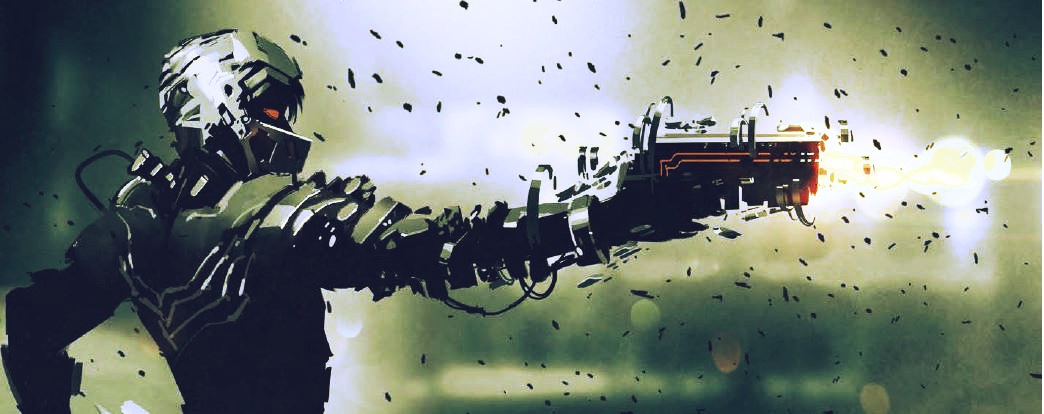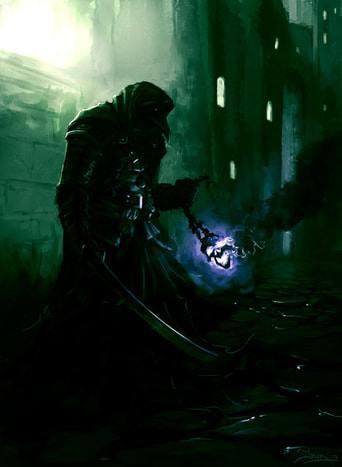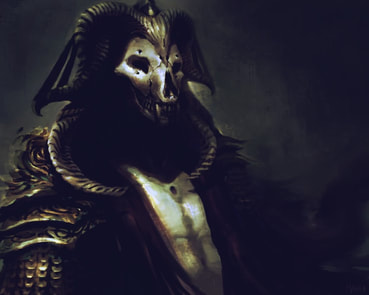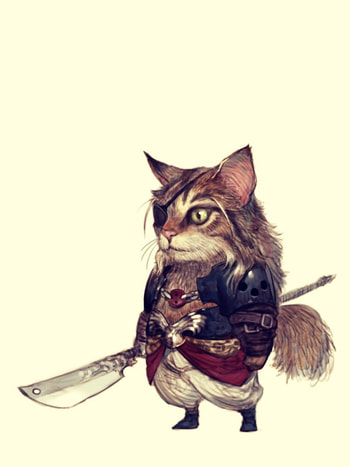|
The following is a reflection on our current state of affairs, world, and life goals. It might offer insight into my personal pursuits, reminders in this strange time, and advice from my own paradigm. I exist currently in the between-times. A limbo of sorts; preparing more distance learning materials for my students while maintaining an online presence, but attempting to use my time wisely so as not to stagnate in my skills, goals, and creative pursuits. Normally this would mean more writing, composing, and painting, and maybe some extra time to work out and maybe meditate. Good things, right? And yet, I am sometimes hollow. The lack of connection, despite video chats. Lack of traditional business, even with the digital tools at our fingertips. It's only Day 4, and I'm losing my temper with people over little things. Something snapped. I threw my mouse across the room. It's wireless, and I've replaced the batteries several times to no difference in quality. It jumps and jitters around, unable suddenly to do its job. So. I threw it out the office door and watched it bounce on the tile in our living room, the cover dislodging at the first impact, a battery singing into the air to ricochet off the ceiling, and the body skittering to a stop by our back door. I don't break things usually. All things considered, I'm a pretty chill dude. However, as I believe with most "chill" people, we all have our things. The little pieces of our world that just bother us; we might be aware of them, we might be working on them (as I do), but they're still there. We cannot deny their existence nor their weight upon us, and though we may be better equipped to handle them at times than others, they are ever-present and looming. For me, it is a perceived lack of production. If I am not producing a blog, a podcast, a paint job, a song... I feel like garbage. And with our current climate, I am blessed with sudden and isolated time. And yet, I felt trapped, unfocused, and frustrated, despite my long list of tasks I could complete. So I broke something. Interrupted the thought cycle and released some energy. Then marched my stupid face down to the basement and did a workout. Ninety minutes later, soaked in sweat and tears, I was a new man. Motivated, sore as hell, and ready to go. Like I'd been asleep to the world until this moment. And, you know, that's completely fair. Quite a bit changes each day lately, and A LOT of people's lives have been upended by our current events; there are numerous questions in the air, ever-evolving information, and a need to take things one day at a time. My wife told me that I had been in a state of "mourning." Mourning the past paradigm, mourning the current state of our lives, and quite literally moving through those stages of grief. We've come now, ladies and gentlemen, to Acceptance. Now we can move forward. Here are some things to remember, from my own perspectives, as we wade through this strange time. Take A BreathPractice: Patience and Perseverance This is not permanent. It sucks, in plentiful ways. Many are still working, many not, and still many more existing in the grays between - unable to reach out for basic human contact and still required to exist. It calls into question every fiber of our humanity, and yet we must persist. It is only Day 4 of this, and people are already panicking. We have lived through worse as a human race; being a scared little welp helps no one. Read, learn, and do what is right for the community to stay safe. Be kind to your young ones; they're scared and those less equipped aren't helping their hope. BE THEIR HOPE. We're going to be okay. Take it one day at a time and practice. Get MovingPractice: Self Care and Fitness Some news outlets have thrown up their hands in disgust, exclaiming "What's the big deal? Just hunker down and watch some more TV!" ...That's terrible advice. Yes, at a COMPLETE LOSS of things to do, I guess TV is a thing. Maybe I just have "too many" hobbies, but TV is literally the last thing on my mind. I could record a song, catch up on my Japanese, write a goddamn book, READ a book, paint a portrait, finish my IT cert, clean the basement, put together a bookshelf (done!), EXPRESS MYSELF...in millions of ways that aren't the soul-crushing deluge of Facebook posts of fear and turmoil. And I can finally exercise on a functional schedule. Which, for me, is 5 days a week. I achieved that for about 2 weeks back when QWay was open and I felt like a freaking superhero. Be a freaking superhero. ...Because you definitely are (you just have to believe it too). Unplug and ReconnectPractice: Self-Talk, Focus, and Meditation I rebooted my daily meditation. I had lost track of it in the madness. I had lost track of my nerves, my energy, and my center. My center. I'm going to need that. I don't need to be constantly online. Given our quarantined state, any modicum of human connection will be essential, but not to the point of obsession. There is a line. And if you approach that line, put it down, take a deep breath, and do something else. My favorite is grounding myself. I lie flat on the floor and feel my whole body get heavy; reconnect to the earth beneath me. Ground my spirit and my soul and remind me that I am okay. I am alive. I am powerful. And if I feel the pull that I am powerless, I HAVE THE POWER to change that feeling within myself. I can control myself in a space of chaos; I am the gatekeeper to my own mind. Never a victim of my surroundings unless I choose to be. Turn off the news and listen to music. Turn off YouTube and read a book. Turn off the TV and play a board game. Just because we CAN be online all the time doesn't mean we should. Take some intimate time with yourself and tend to your personal garden. Remember, you're the one that has to live in it. Pull up those weeds - without getting angry that they're there - add some fresh soil, water, maybe do some trimming, and perhaps you'll be inspired to change up a few things, or revisit that old tree that you used to love that lies gnarled and forgotten in the back of your grove. That one with the swing; old scraps of parchment and paintbrushes tucked away in its roots. Maybe that old love needs some attention too. ...Yes this metaphor has multiple layers. Like a parfait. Be Kind To Future AdamPractice: Hope and Practicality The future is not yet written, and we can learn from the past, even our most recent. Plan and prepare, but do not obsess. Be proactive, but hopeful. Don't leave the important stuff to chance, but if that's done already, believe that this, too, will pass. And you know your future self quite well; we know the stress of a lack of time. Which promise do I sacrifice to maintain the current lie of my past? And what excuses are the proper weight to this scale of forgiveness for my future self? A justification for a lack of plan and follow-through is a weakness so many people have, and it will be a great tide to overcome in the coming weeks. Pursue a better tomorrow by leaving today in a better place than when you began. Be kind to your future self by taking care of the pressing matters now, even though you're tired. Plan accordingly so your future self can keep his word. Portion out those cookies now so future you can enjoy them too in a few days. And not because we're in dire straits, but because we're fighting for a better place for our future selves to live. We don't know what tomorrow will bring, so give your future self a fighting chance. Give your world a fighting chance. I'll see you at the table, digital or otherwise.
Be safe. Be kind. Don't forget to love yourself. -Adamus
0 Comments
I came to this entry after a few weeks of interpersonal fire avoidance. It drains me when I need to do it on multiple fronts, and there's a lot to be said in taking your own space, but still being supportive of others' plights. The silver lining to all of this is that it also puts me in a reflective mood. And I've been pondering on the ever-changing state of my favorite event in recent memory: The Gray Owls. It took Knight Owls 2 years to settle into its own identity, and Gray Owls is nearing that threshold. A lot has clarified in that time (like the need for two parties - I'll touch on that later). I learned a lot about the type of experience I wanted to offer over that time, and the lessons I've learned from it moving forward. What is this supposed to be?Gray Owls is a D&D experience built for mature, experienced, and resilient players. The world is dark, dangerous, and complex. It's also for 21+ players, so BYOB is allowed, and the space is safe to swear and drink and such. Mature because it allows me and the players involved to explore themes and narratives that can get a little intense. Now, with my blog on Boundaries, there are certain elements of our reality that I don't allow at the table no matter what, but things can still get deliciously twisted and that's alright. Experienced because the mechanics of the game should be clear and smooth, opening up our proverbial "action economy" to the higher nuances of our social and exploration pillars. It also implies that the player's agency should be elevated; much of the story is shaped by their choices and motivation. Resilient because it might get a little rough. Emotions can get intense, the story might get complicated, and a lot of it is painted in shades of gray. The decisions you make may not be "right," but you still need to make them however you make them. Regardless of what you choose, there will be consequences and fallout. For tone and storytelling, it becomes an landscape of mature themes, high emphasis on exploration and social interaction, with intense fights to punctuate the story beats. We've gone whole 9 hour sessions without a fight, and everyone walks away satisfied, but that makes the battle, when it comes, that much more valuable. The social contract is one of respect as players navigate an immersive game, but at the end of the day, we can't take things personally because it's still a game. The Effect So FarAfter chapters 1 and 2 of Gray Owls, the group seemed to really jive. The effect was like trying to capture lightning in a bottle. I fought for that feeling, sometimes too hard, every chapter going forward. It's true that when you're running a mature-themed scenario, where most opted in to a less than trustworthy relationship with characters, sometimes the first boss monster is the group dynamic - just growing into a dysfunctional, pyro-persuaded family that might actually trust each other. That growth was represented for Chapters 1 through 12A (our first 2-parter). John and I agree that from 12B onward marks our Phase 2 of the story. Now that the party actually trusts each other (mostly), and have united against a more or less common enemy, the momentum will only get faster toward a narrative conclusion. A year of groundwork has been laid, and dozens of moving pieces have been set in motion. I expect the players to interact with 3, maybe 4 of them, and the rest is just me playing with my toys as forces move in the background. In Phase 1 (Chapters 1-12A), the characters navigated a grim world of social manipulation, conspiracy, bounty hunters, and arson. Gray Owls is built to be intense and quick - each session picks up immediately where the last ended, given a few hours here and there. Meaning, in game time, the whole campaign has only been a little under a month. Forces and change are moving quickly, bringing our heroes into play just at the cusp of something epic. Chapters 12B to 14 were in Feathertongue, where the group was able to finally take a moment to breathe and explore without threat of discovery. Yet, something was burrowing beneath the city, and upon its attack, it supported the moment when the already huge group of 10 could split up; 6 would return to the main city of Stormwrack, while 4 would pick up 2 new allies in Feathertongue and head northward to deal with this threat from the Shadowfell. Thus marks the official Phase 2 as the party splits to pursue the two main plot threads. This also serves as a stylistic restructuring and clarification as the groups now tend toward more Cloak and Dagger and more Bug-Crushing Combat, and remain separated. This has made a world of difference in both timing - as sessions can last more around 6 hours instead of 9, and we get more done - and dynamic. We get to talk MORE and fight MORE, and everyone has been consistently more satisfied session to session. It's like the game was made for a group of 4-6 people or something! The Need For ProgressionSmaller groups means more getting done interpersonally, socially, and combatively, all while consuming less of our personal stamina. In other words, we're doing more with less, and it doesn't feel like work. This means: MOMENTUM. By now, we've spent 14 levels building up the world and our relationships in it, but unable to affect the larger scale events in big ways. Now, the characters have tools, power, and a direction, so they undoubtedly will desire to speed forward. Ahead lie tangible goals, dark secrets, and enough agency to explore them without getting caught *too* off-guard. And with each new discovery, the implications and seeds sown throughout the entirety of Phase 1 are paying off. Massive doses of interconnected lore finally recognizing their one missing piece. The last "Team Bug" session, our party in the north, enjoyed a mind-blowing experience calling back all the way to Chapter 2 and every instance moving forward. It clarified dozens of plot hooks, holes, and character misalignments. ...It's like I planned this thing, or something. It is so rewarding to watch my players figure things out. I'll give guidance where they're stuck, but Gray Owls is something special where I need to hold out just a bit longer until they're ready for the reveal. They have to EARN it in the narrative, because it will be that much sweeter to discover it in an organic way. They are getting so close. ...But not yet. Not. Yet. The Need To Slow DownOne of my players described Gray Owls as a world where the only real currency is the information you gather and how you choose to spend it. I couldn't agree more. In a Cloak and Dagger scenario (dubbed Team Tree for the group back in the city), a quick way to die is to act without knowing what you're getting into. Though the party is currently Level 17, the time when one might start fighting gods in the traditional game...with a lack of specific tactical, social, and subterfuge information, as well as mounting influence and pressure from their clashing forces, no one feels like they're level 17. And to be perfectly honest, that was the intention all along. The magical weave is broken, the druids are dead, warlocks and their patrons are being consumed, and the shadow organizations meant to keep the world safe have grown corrupt. This is not a happy fantasy, nor is it remotely safe, so navigating it requires reconnaissance with eyes and ears open. Going off on your own can be tricky, especially as those in the background move their pawns, position their knights, and prepare to flip the board. Rash decisions can still kill you, even if you might get a few good swings in at your new power level. Yet... It is not hopeless. Every session, threads of understanding are woven together in the party, with thickening webs for each personal story. Some gather at the outset, while others enjoy being closer to the center, yet all are blind to the grand weave that connects them all...and only I can see the ripples of their smallest decisions, ever-changing the flow of time and intention. Each choice, each action, sets another in motion; some predictable, many more random. And the final truth - they are strongest when together. But that won't stop a path to vengeance, or a tether to break, or a god to a raise, or a seed to plant, so they must balance between living and surviving. And that takes TIME. When social interaction is your main weapon, we have to allot appropriate time to navigate such situations. Which also means patient players, willing to listen and watch and wait for their time to shine. And this group DELIVERS with remarkable consistency in that regard. The Need For AftercareThough a dark world it is and we all knew it was coming, sometimes we just feel more than we thought we would. An interaction might spark a memory, some deep laid pain. Or something visceral brings out the fire inside that you never was there, and it has SOME THINGS TO SAY. So. We take a breath. We take a break. We talk it out if we need. Then we come back to the table. And the more these moments come up, the more resilient we become. We would never know what was going to affect us so fervently until it did, but then we can become skilled in pivoting, adapting, observing, and moving on. I also know that my lovely players and their backstories...might have become more tragic as time goes on. There can be a lot of personal pain that drives good storytelling, but that doesn't mean it won't hurt when it arrives. What has to happen when that hurt comes is a mature mind to say "it's just a game." Now, that doesn't give me license to inflict truly abusive elements onto my players (see "Boundaries"), but it does mean that I check in with them often to see where they are in their player headspace, and character space. Emotional resilience can open the door to those rougher story threads, but a player having a tough time might be unprepared for such things. So I try to time it, I try to check in, and if nothing else, I try to listen. It may be "just a game," but as John and I know, some games can change a person's life, and the people you play with can share that experience with you. You are not alone. Stamina At The TableThe more comfortable we are in our spaces, often the longer we play. At this point, I plan about 12 hours of content (with story beats and possible chapter closes throughout) every session. This ensures that if the players skip a hook or two, we're still covered in content AND if they decide to indulge in a hook or two, I've got more for next time. However, everyone has their limit. For me, it's CURRENTLY about 7 hours of play without an extended break (30-60 minutes). After that point, Exhaustion rears its ugly head. That's when notes and ideas come half-formed (even with my notes in front of me), interactions get scattered, pet-peeves creep into my psyche (harmless phones, loud jokes that pull attention, players seemingly "losing interest" [which has the added mantra of "you're a failure - you're losing them - get on your game!"]), and I start losing track of where we are and what we're doing. A Lesson: I need to close a chapter before we all fall down. There's something black magical about that prime 6:00-12:30 range; we're all on the same wavelength, running and gunning, making our plans, and executing with ease. ...But after that time, when we start pushing the 1am and 2am slots, players start dropping. Combat becomes a definitive NO, and Role-Play becomes much more like herding the proverbial cats. So, even if the players say at 12:30 "We'll play all night!" chances are they'll start dropping off by 1am, so perhaps a chapter close is still most appropriate. Our most recent session demonstrated this loud and clear. We had just done a massive, character-driven mini-arc, completely motivated and fortified by the players and their agency, and were this a book for real, that's where the chapter would end. ...And instead, we kept going. And, though most had a good time, we started struggling in small, but important ways. I started struggling in big ways. That's the marker. Hey, maybe we should stop. My personal level up is extending my personal stamina for combat and RP interactions from 5 hours to 7. Next goal will be 9, but we'll give it time. For my players, a level up for you will be to do the same; take note of when you feel yourself losing focus and you may begin to build a better sense of where your stamina lies for the Three Pillars Of Play at the table. I Love These Dumb Nerd CatsRegardless of any introspection and reflection, the sentiment remains: I love these nerds. They challenge me to be better every day, and to consistently offer something unique and worthwhile - all while adding quality to a tabletop experience. It is in these people that I see my dreams; a community, a tribe, a party. And though many of these people began as my clients, many also have become friends. I feel like that's normal in this line of work - an entertainer in multiple settings will undoubtedly reach a level of rapport with those he entertains on a consistent basis, and a GM worth their salt has to develop a strong relationship with each player. That's the experience they've come to expect, and I'm happy to deliver. I can start to relax into being human around them, as I allow and support them through their own humanity, as per my professional promise for a good experience.
And that's not to say I don't lose my cool sometimes, or they don't have an off-day, or sometimes they're not a gaggle of distracted kittens swinging flails, but this is a tabletop game and no matter how strong our social contracts, setup, rapport, or execution...we collectively and willingly invite chaos to our table. And in the name of fun, I wouldn't have it any other way. So as we march to the end of Book 1, we remind ourselves of the marathon over the sprint, of the many questions and answers to come, and remember to tackle it with maturity and patience. I will endeavor to do the same. See you at the table, ya beautiful wandering kittens. -Adamus |
Adam SummererProfessional Game Master musician, music teacher, game designer, amateur bartender, and aspiring fiction author. Honestly, I write what I want when I want. Often monster lore, sometimes miniature showcases, and the occasional movie/show review.
Archives
September 2023
Categories
All
|






 RSS Feed
RSS Feed